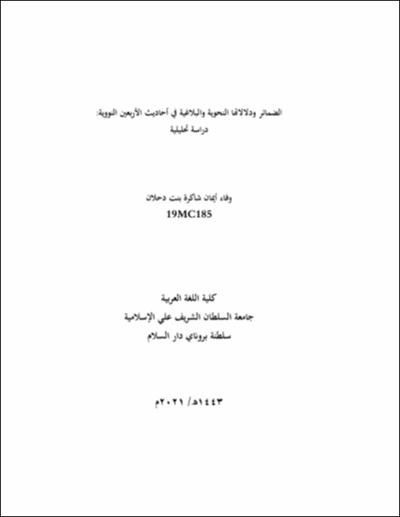| dc.description.abstract | This study discuss the analysis of pronouns in terms of grammar and rhetoric in the Forty Hadiths of al-Nawawi. This title cover two main subjects, such as grammar and rhetoric. It focuses on the pronouns that have been mention in the text of the Forty Hadiths of al-Nawawi without the context. It depends on the descriptive analysis method. The study contains an introduction and followed by five chapters then a conclusion and bibliography. The first chapter is about the basics of the study which contains the definition of the title, problem statement, research question, research objective, the importance of research, literature reviews, scope of the research, methodology and terminology. The second chapter is about the background of Imam Al-Nawawi and his book Forty Hadith al-Nawawi. While the third chapter identifies the meaning of pronouns, their division and the meaning implied in it, and also the terms of pronouns and their position. The fourth chapter contain the analysis of pronouns in the Forty Hadiths of al-Nawawi in terms of grammar, which are the Overt Pronouns (الضمائر البارزة ), the Covert Pronouns (الضمائر المستترة ) and Pronoun of Matter (ضمير الشأن ). The fifth and the last chapter touches on the definition of rhetoric, importance and purpose of studying rhetoric and also the position of Hadith and the characteristics of prophetic rhetoric, then the analysis of rhetorical secrets in pronouns, such as poem, precede the predicate and subject, declarative sentence and Iltifat. Lastly, the summarization of this study conclude with the results and the recommendations of this study and ended with the sources and references. The end result of this study, we can identify the frequency of using pronouns in the Forty Hadiths of al-Nawawi and the main result is the understanding of pronouns in detail, in which it will make the students master in case “I’rab”, especially in pronouns. They must know and understand the pronouns in terms of rhetoric as well, because high knowledge and accurate understanding of prophetic eloquence is not possible except by learning further about the science of rhetoric. | en_US |



